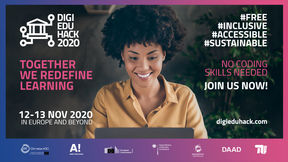DigiEduHack 2020: Made in Aalto!

What if contributing to change the future of education was open to everyone? That's exactly the concept of DigiEduhack, a series of online, offline and blended hackathons aiming at building solutions to current and future digital education challenges in Europe and beyond.
DigiEduHack is an initiative of the European Institute of Innovation and Technology (EIT) under the European Commission's Digital Education Action Plan of 2018, led by EIT Climate-KIC and coordinated by Aalto University, Finland. This year the main stage event hosted by the German Presidency of the Council of the European Union.
DigiEduHack is not just an event: it's a free, inclusive and sustainable movement that gathers stakeholders from the whole educational scope- learners, researchers, innovators and citizens from around the world, all united by their aspiration to make a positive change in digital education using co-creation and user-driven innovation.
This all makes DigiEduHack apart from traditional hackathons: the biggest reward for taking part in DigiEduHack is not the money prize but the opportunity for the participants to leave a mark and make an impact in digital education. "DigiEduHack was created as a digital education experimental platform that reduces the distance between an innovative solution and its real-life implementation. The aim here is to inspire user-driven solutions co-created by a community of visionaries", explains Mariya Gabriel, the European Commissioner for Innovation, Research, Culture, Education and Youth. "We believe that co-creation and experimentation can contribute to bringing deep changes in digital education and help increasing digital literacy in Europe: this is the reason why DigiEduHack is one of the initiatives under the Digital Education Action Plan 2021-2027 of the European Commission. I am delighted that this year the main stage event will be also an opportunity to present the Education and Training Monitor on digital education’ she adds.
Mariya Gabriel, the European Commissioner for Innovation, Research, Culture, Education and YouthWe believe that co-creation and experimentation can contribute to bringing deep changes in digital education
DigiEduHack 2020 will take place with a series of 63 simultaneous local hackathons organised in 36 countries, gathering more than 2000 registered participants, with a global main stage event held in Berlin. "DigiEduHack is a decentralised organisation that allows each host to choose among 8 proposed themes and craft their own challenge according to local needs, resources, and ambitions", explains Ida Andersson, the DigiEduHack project manager from Aalto University. "In order to be as much inclusive as possible, the local hosts can adapt the duration of their event to their audience. This year, our youngest participants are in 5th grade."
Aalto University is proposing a challenge at the forefront of digital innovation in education: "Learning with AI: how to make the best use of artificial intelligence for learning new skills, attitudes, values, or new kind of thinking? For Dr. Tomi Kauppinen, the challenge holder, "the question of artificial intelligence in education is not "when?", it is "how?". We already witness and create the AI revolution. We need to find new ways to teach, learn and assess using artificial intelligence for the benefit of the learners and the educators. We can find ways to use AI in an inclusive manner, with standards and a high level of ethics to meet learning objectives. We can learn to learn with AI. Our challenge is free and open to everyone, from anywhere in the world: join us!"
Read more about this amazing challenge and the issues it raises here: https://onlinelearning.aalto.fi/events/learning-with-ai-challenge-at-digieduhack-2020
Once their hackathon is done, each local host chooses a winning solution using a standardised evaluation canvas. All local wining solutions are then submitted to the DigiEduHack steering group, who chooses 10 finalists which are in turn uploaded to the United Nations "Unite Ideas" platform for public voting. The three solutions with the most votes are declared global winners and are awarded 5000€ each for further development.
The Main Stage event is crowning this series of hackathons. The Main Stage Event is an opening and a closing ceremony for all the DigiEduHack events worldwide, as well as a high-level event on digital education featuring inspirational speakers, experts and key policymakers. You can read here about the Main Stage Event:
More about DigiEduHack: https://digieduhack.com/en






